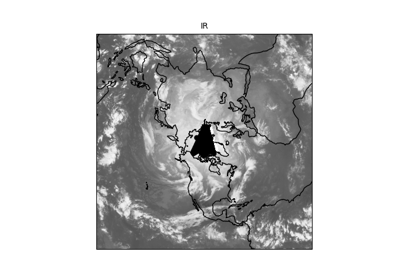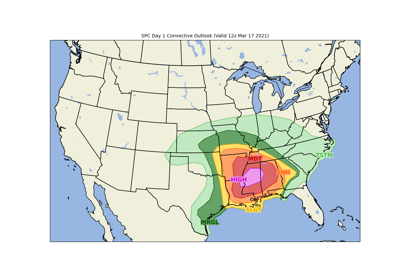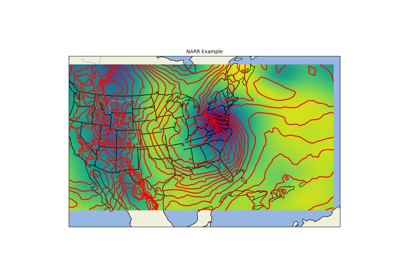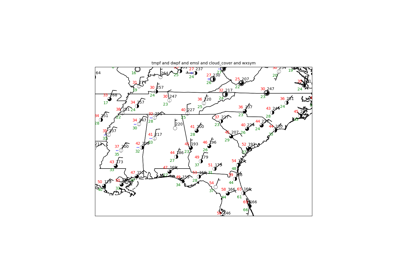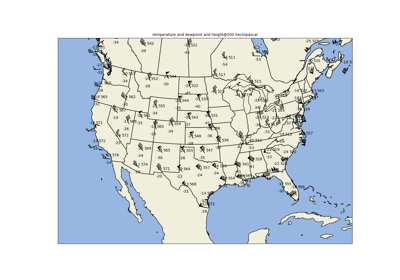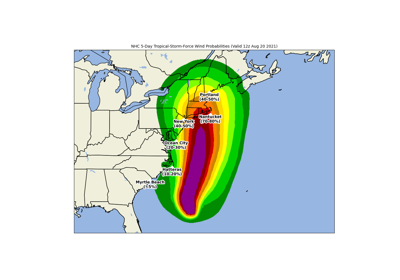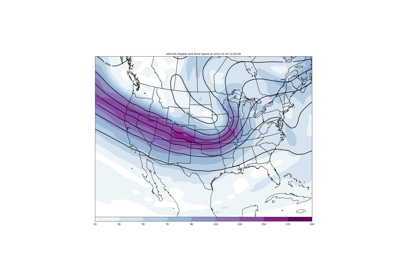PanelContainer¶
- class metpy.plots.PanelContainer(**kwargs)¶
Collects panels and set complete figure related settings (e.g., size).
Attributes Summary
A contextmanager for running a block with our cross validation lock set to True.
Provide access to the underlying figure object.
Provide simple access for a single panel.
A list of panels to plot on the figure.
This trait takes a tuple of (width, height) to set the size of the figure.
Methods Summary
__init__(*args, **kwargs)add_traits(**traits)Dynamically add trait attributes to the HasTraits instance.
class_own_trait_events(name)Get a dict of all event handlers defined on this class, not a parent.
class_own_traits(**metadata)Get a dict of all the traitlets defined on this class, not a parent.
class_trait_names(**metadata)Get a list of all the names of this class' traits.
class_traits(**metadata)Get a
dictof all the traits of this class.copy()Return a copy of the panel container.
draw()Draw the collection of panels.
has_trait(name)Returns True if the object has a trait with the specified name.
Context manager for bundling trait change notifications and cross validation.
notify_change(change)Notify observers of a change event
observe(handler[, names, type])Setup a handler to be called when a trait changes.
on_trait_change([handler, name, remove])DEPRECATED: Setup a handler to be called when a trait changes.
refresh(_)Refresh the rendering of all panels.
save(*args, **kwargs)Save the constructed graphic as an image file.
set_trait(name, value)Forcibly sets trait attribute, including read-only attributes.
setup_instance(**kwargs)This is called before self.__init__ is called.
show()Show the constructed graphic on the screen.
trait_defaults(*names, **metadata)Return a trait's default value or a dictionary of them
trait_events([name])Get a
dictof all the event handlers of this class.trait_has_value(name)Returns True if the specified trait has a value.
trait_metadata(traitname, key[, default])Get metadata values for trait by key.
trait_names(**metadata)Get a list of all the names of this class' traits.
trait_values(**metadata)A
dictof trait names and their values.traits(**metadata)Get a
dictof all the traits of this class.unobserve(handler[, names, type])Remove a trait change handler.
unobserve_all([name])Remove trait change handlers of any type for the specified name.
Attributes Documentation
- cross_validation_lock¶
A contextmanager for running a block with our cross validation lock set to True.
At the end of the block, the lock’s value is restored to its value prior to entering the block.
- figure¶
Provide access to the underlying figure object.
- panel¶
Provide simple access for a single panel.
- panels¶
A list of panels to plot on the figure.
This trait must contain at least one panel to plot on the figure.
- size¶
This trait takes a tuple of (width, height) to set the size of the figure.
This trait defaults to None and will assume the default
matplotlib.pyplot.figuresize.
Methods Documentation
- __init__(*args, **kwargs)¶
- add_traits(**traits)¶
Dynamically add trait attributes to the HasTraits instance.
- classmethod class_own_trait_events(name)¶
Get a dict of all event handlers defined on this class, not a parent.
Works like
event_handlers, except for excluding traits from parents.
- classmethod class_own_traits(**metadata)¶
Get a dict of all the traitlets defined on this class, not a parent.
Works like
class_traits, except for excluding traits from parents.
- classmethod class_trait_names(**metadata)¶
Get a list of all the names of this class’ traits.
This method is just like the
trait_names()method, but is unbound.
- classmethod class_traits(**metadata)¶
Get a
dictof all the traits of this class. The dictionary is keyed on the name and the values are the TraitType objects.This method is just like the
traits()method, but is unbound.The TraitTypes returned don’t know anything about the values that the various HasTrait’s instances are holding.
The metadata kwargs allow functions to be passed in which filter traits based on metadata values. The functions should take a single value as an argument and return a boolean. If any function returns False, then the trait is not included in the output. If a metadata key doesn’t exist, None will be passed to the function.
- has_trait(name)¶
Returns True if the object has a trait with the specified name.
- hold_trait_notifications()¶
Context manager for bundling trait change notifications and cross validation.
Use this when doing multiple trait assignments (init, config), to avoid race conditions in trait notifiers requesting other trait values. All trait notifications will fire after all values have been assigned.
- notify_change(change)¶
Notify observers of a change event
- observe(handler, names=traitlets.All, type='change')¶
Setup a handler to be called when a trait changes.
This is used to setup dynamic notifications of trait changes.
- Parameters
handler (callable) – A callable that is called when a trait changes. Its signature should be
handler(change), wherechangeis a dictionary. The change dictionary at least holds a ‘type’ key. *type: the type of notification. Other keys may be passed depending on the value of ‘type’. In the case where type is ‘change’, we also have the following keys: *owner: the HasTraits instance *old: the old value of the modified trait attribute *new: the new value of the modified trait attribute *name: the name of the modified trait attribute.names (list, str, All) – If names is All, the handler will apply to all traits. If a list of str, handler will apply to all names in the list. If a str, the handler will apply just to that name.
type (str, All (default: 'change')) – The type of notification to filter by. If equal to All, then all notifications are passed to the observe handler.
- on_trait_change(handler=None, name=None, remove=False)¶
DEPRECATED: Setup a handler to be called when a trait changes.
This is used to setup dynamic notifications of trait changes.
Static handlers can be created by creating methods on a HasTraits subclass with the naming convention ‘_[traitname]_changed’. Thus, to create static handler for the trait ‘a’, create the method _a_changed(self, name, old, new) (fewer arguments can be used, see below).
If remove is True and handler is not specified, all change handlers for the specified name are uninstalled.
- Parameters
handler (callable, None) – A callable that is called when a trait changes. Its signature can be handler(), handler(name), handler(name, new), handler(name, old, new), or handler(name, old, new, self).
name (list, str, None) – If None, the handler will apply to all traits. If a list of str, handler will apply to all names in the list. If a str, the handler will apply just to that name.
remove (bool) – If False (the default), then install the handler. If True then unintall it.
- save(*args, **kwargs)[source]¶
Save the constructed graphic as an image file.
This method takes a string for saved file name. Additionally, the same arguments and keyword arguments that
matplotlib.pyplot.savefigdoes.
- set_trait(name, value)¶
Forcibly sets trait attribute, including read-only attributes.
- setup_instance(**kwargs)¶
This is called before self.__init__ is called.
- trait_defaults(*names, **metadata)¶
Return a trait’s default value or a dictionary of them
Notes
Dynamically generated default values may depend on the current state of the object.
- classmethod trait_events(name=None)¶
Get a
dictof all the event handlers of this class.- Parameters
name (str (default: None)) – The name of a trait of this class. If name is
Nonethen all the event handlers of this class will be returned instead.- Returns
The event handlers associated with a trait name, or all event handlers.
- trait_has_value(name)¶
Returns True if the specified trait has a value.
This will return false even if
getattrwould return a dynamically generated default value. These default values will be recognized as existing only after they have been generated.Example
class MyClass(HasTraits): i = Int() mc = MyClass() assert not mc.trait_has_value("i") mc.i # generates a default value assert mc.trait_has_value("i")
- trait_metadata(traitname, key, default=None)¶
Get metadata values for trait by key.
- trait_names(**metadata)¶
Get a list of all the names of this class’ traits.
- trait_values(**metadata)¶
A
dictof trait names and their values.The metadata kwargs allow functions to be passed in which filter traits based on metadata values. The functions should take a single value as an argument and return a boolean. If any function returns False, then the trait is not included in the output. If a metadata key doesn’t exist, None will be passed to the function.
- Returns
A
dictof trait names and their values.
Notes
Trait values are retrieved via
getattr, any exceptions raised by traits or the operations they may trigger will result in the absence of a trait value in the resultdict.
- traits(**metadata)¶
Get a
dictof all the traits of this class. The dictionary is keyed on the name and the values are the TraitType objects.The TraitTypes returned don’t know anything about the values that the various HasTrait’s instances are holding.
The metadata kwargs allow functions to be passed in which filter traits based on metadata values. The functions should take a single value as an argument and return a boolean. If any function returns False, then the trait is not included in the output. If a metadata key doesn’t exist, None will be passed to the function.
- unobserve(handler, names=traitlets.All, type='change')¶
Remove a trait change handler.
This is used to unregister handlers to trait change notifications.
- Parameters
handler (callable) – The callable called when a trait attribute changes.
names (list, str, All (default: All)) – The names of the traits for which the specified handler should be uninstalled. If names is All, the specified handler is uninstalled from the list of notifiers corresponding to all changes.
type (str or All (default: 'change')) – The type of notification to filter by. If All, the specified handler is uninstalled from the list of notifiers corresponding to all types.
- unobserve_all(name=traitlets.All)¶
Remove trait change handlers of any type for the specified name. If name is not specified, removes all trait notifiers.
